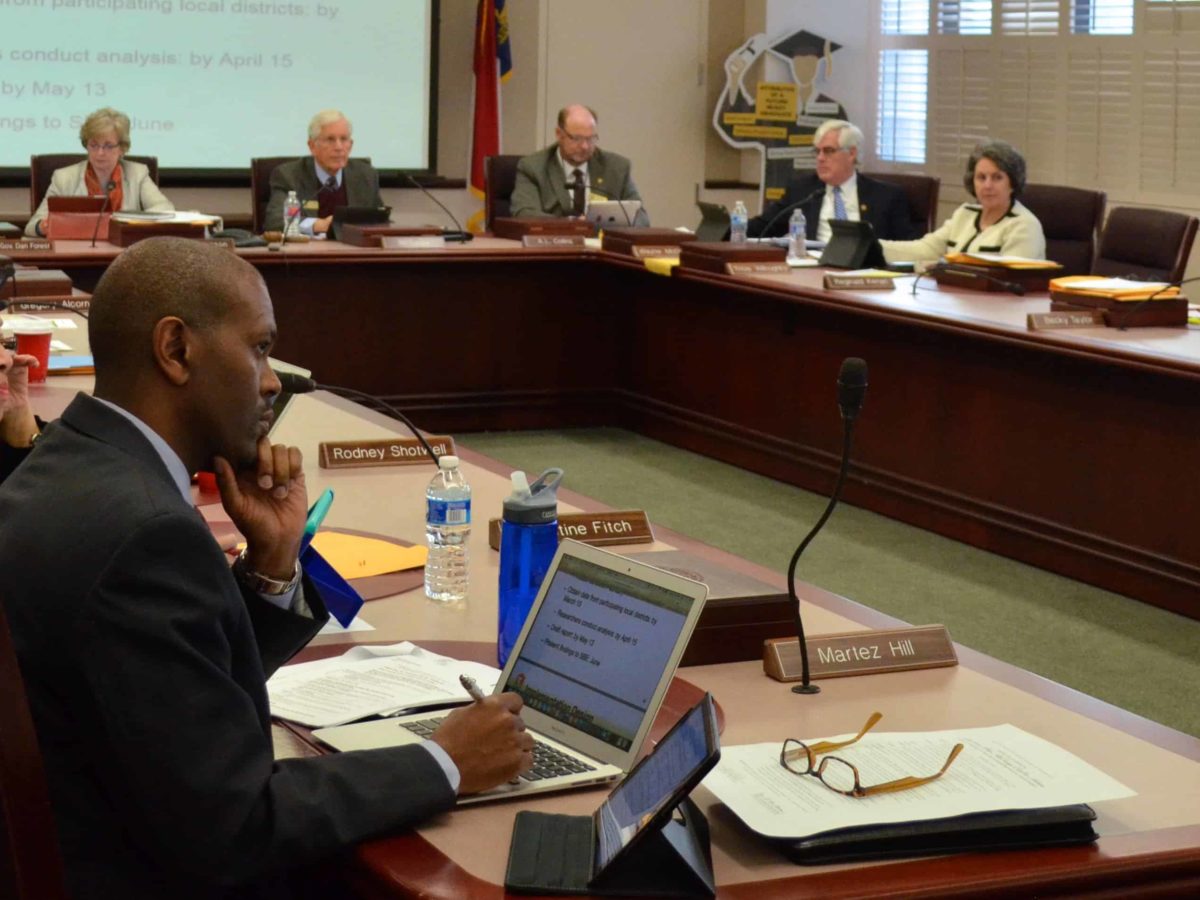

Charter schools were a contentious portion of the State Board of Education during the first day of its two-day meeting last week. Board members expressed concerns over Charter School Advisory Board recommendations on a few charter schools, which the board will vote on in February. And Lt. Gov. Dan Forest stated his worry about the tone of a report to the General Assembly on charter schools, leading ultimately to a postponement of a vote and a decision to send the report to the Charter School Advisory Board for its perusal.
Annual Charter Schools Report
When it came time to cover the Annual Charter Schools Report, Becky Taylor, board member and chair of the Education Innovation and Charter Schools Committee, was poised to move on without much discussion before Forest interrupted with his concerns.
“I felt like in reading through it that some of the information there, statistics, data, was a little bit misleading,” he said. “The report to me didn’t have a lot of positive things to say.”
Forest said that more time needed to be taken with the report and that he would take the heat with the General Assembly for missing the January 15th deadline.
Forest didn’t lay out his specific concerns with the report at the meeting, but he did an interview with Pete Kaliner of WWNC 570 AM in Asheville talking about some of his concerns. Click here to listen to Forest’s take.
Included in the report is a description of the populations served in North Carolina. The report states that “the overall charter schools student population is more White and less Hispanic than the overall traditional school population.”
It goes on to cite research by Helen Ladd, Charles Clotfelter, and John Holbein at Duke University that found that individual charter schools tend to have populations that are either mostly white or mostly minority, and that as time passes, “the share of minority students in charter schools has declined.”
The charter school report also states that charter schools, proportionally, served fewer economically disadvantaged students than traditional schools.
When it comes to children labeled as exceptional, however, charter schools serve about the same percentage of children requiring Exceptional Children services.
The report also states that charter schools have higher percentages of schools with both very low and high grades.
“This suggests that there are higher percentages of charter schools on both ends of the rating continuum and fewer in the average range, as compared to traditional public schools,” the report stated.
At the same time, the report shows that 48.6 percent of charter schools receive a B or better, compared to 29.3 percent of traditional schools.
The report also details some of the economic impacts to traditional public schools from charter schools.
“Many, but not all of the dollars directed to charter schools would have been directed to school districts (traditional public schools), as most charter school students were formerly enrolled in traditional public schools,” the report stated.
But the report goes on to indicate that perhaps the fiscal impact has more to do with the General Assembly than individual charter schools, at least for students entering the system to go to charters.
“To the extent that the General Assembly does not grow appropriations each year in direct proportion to growth in overall student population, home and private schoolers coming into the public system to attend charter schools do decrease funding going to school districts,” the report stated.
In specific areas, the presence of a charter can impact nearby traditional public schools as well, though not always negatively.
The report states that overcrowded urban districts might have less need “to expand facilities if significant numbers of students choose charter schools instead.”
The report also says that charters give “alternative education options for parents,” though it notes that “the true availability of these alternative options may be limited for some families in cases where a charter does not provide the same level of transportation or school nutrition services as the local school district.”
Competition between charters and traditional public schools may help focus both types of schools and prompt them to experiment in ways that can improve student outcomes, the report states. It also says that charter schools may lead parents to be more engaged in an effort to understand their options.
After Forest spoke, Taylor and others agreed that more time on the report would be nice.
“We would love to be able to spend more time on it, we were just trying to follow the timeline,” Taylor said.
State Board Chair Bill Cobey said he thought the General Assembly would understand.
“I think the General assembly wants us to get it right rather than to rush,” he said.
Superintendent June Atkinson told NC Policy Watch that she doesn’t think the report will change much.
“I don’t see how (the report) could be different,” said Atkinson. “We have used the facts,” she is reported as saying in an article by Billy Ball, a reporter at NC Policy Watch.
Charter Schools Renewal
When discussing renewals of charter schools, the contention began with a discussion of Kennedy Public Charter School in Charlotte, which has been in existence for 13 years and serves a marginal population.
The school’s website describes it as, “a tuition-free school serving K-12 students primarily from communities that tend to be marginalized in education.”
Board member Kevin Howell questioned the Advisory Board’s decision not to renew, especially given how long Kennedy has existed and the population it serves.
Alex Quigley, chair of the Advisory Board, explained that its members voted 9-2 not to renew the charter for a variety of reasons including performance and financial issues.
He said that the academic performance was going in a “downward trajectory.” Howell noted that the school had met growth the past two years. Quigley acknowledged that but said the school declined significantly this past year.
He also said that during its 13-year run, the school had inconsistent academic performance and that school officials seemed confused about what kind of school they were running — classical, S.T.E.M., or back-to-basics.
“When pressed in the meeting, it wasn’t clear…that they had really thought through moving forward how they were going to continue to improve this program,” Quigley said.
He also said that the school had a warning for financial noncompliance and a declining fund balance. And, in the midst of low academic performance, Quigley said school officials told him they were planning to reduce the budget by $1 million, mostly in staffing.
“That didn’t make sense to me,” he said.
Prior to coming up for this renewal, the school had been operating under a three-year renewal.
“To be given a three-year renewal is a pretty serious matter,” Quigley said.
The contention continued with a three-year renewal that the Charter School Advisory Board had recommended for Hope Leadership Academy in Raleigh.
Board member Patricia Willoughby questioned the Advisory Board’s recommendation.
“Sometimes it might be totally appropriate, but for Hope I’m not sure that a three-year renewal is appropriate,” she said.
Hope Leadership Academy is a K-5 school in the Oakwood neighborhood in Raleigh.
Quigley said that while the school was making improvements, it still had further work to do.
“We felt like the data was trending in the right direction for that school,” he said. “But in terms of enrollment as well as student achievement it wasn’t at all where it needed to be. And there were some real questions about the numbers.”
The Advisory Board vote on Hope was unanimous. Taylor suggested the State Board needed to see further information on the school before the State Board’s vote in February.
Change to Charter Revocation Process
The State Board of Education voted to change its policy on initiating revocation for charter schools. Previously, the process would begin if a school did not meet or exceed expected growth and had a proficiency below 60 percent for two of three consecutive years.
The new policy says that any school that does not meet or exceed expected growth and has below 60 percent proficiency for two of three consecutive years is designated “inadequately performing.” It goes on to say that if a charter schools has “operated for more than 5 years and meets the definition of ‘inadequately performing,’ the SBE may initiate revocation of the school’s charter.”
It’s important to note in that definition a subtle change. Previously, the language said that the State Board “shall” initiate revocation. Now the language says the State Board “may” do so. That gives the Board some wiggle room.
The new policy also says that a charter school in its first five years that is “inadequately performing” must develop a strategic plan for improvement. “If the charter fails to demonstrate improvement under the strategic plan within two years of the approval of the strategic plan, the State Board of Education may initiate revocation of the school’s charter.”


